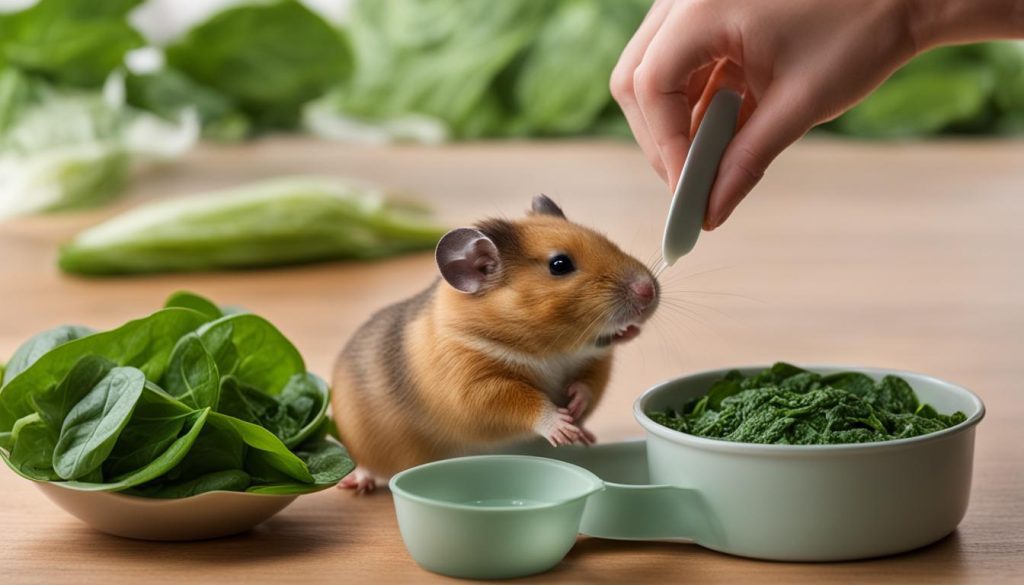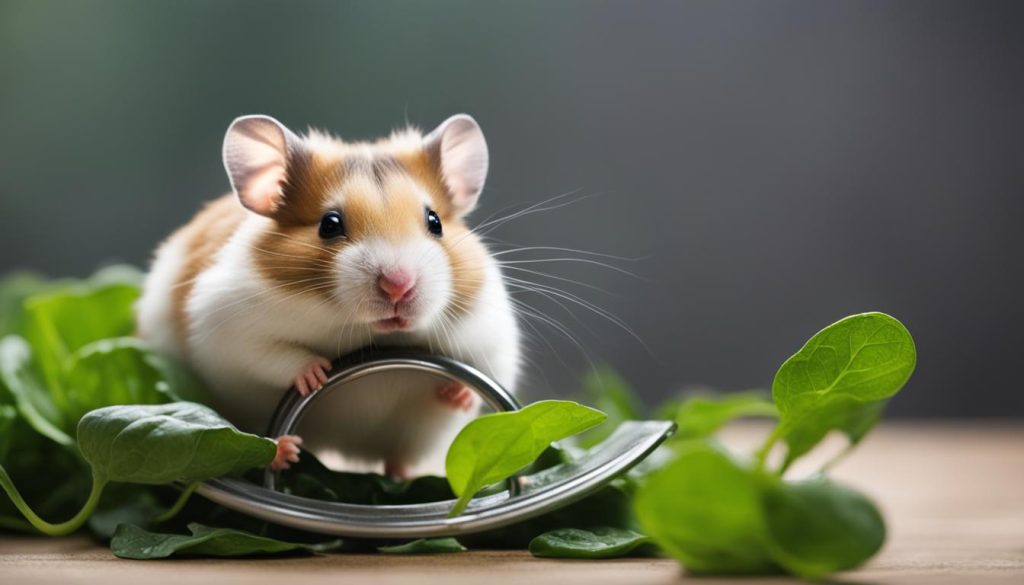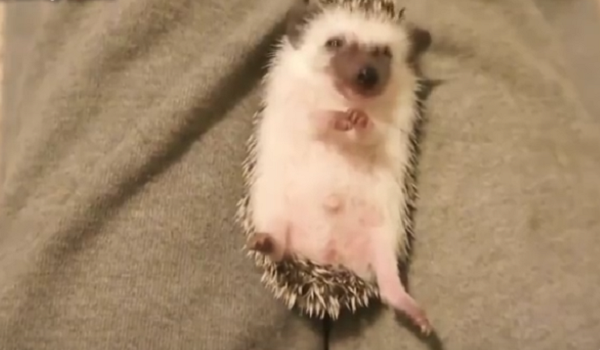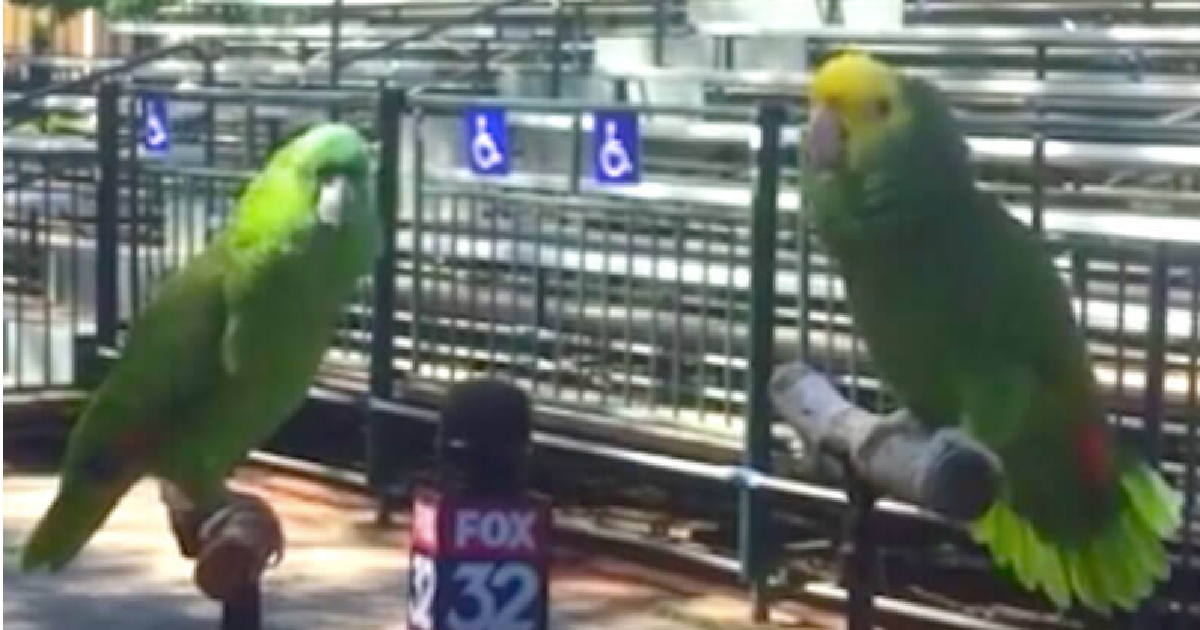When it comes to feeding our furry friends, hamsters have a healthy appetite and enjoy a variety of fresh foods. As responsible pet owners, it’s important to provide them with a balanced diet that includes fruits and vegetables. But what about spinach? Can hamsters eat spinach? Let’s find out!
Spinach leaves can indeed be offered as a snack to hamsters. They are packed with nutrients and can be a tasty addition to their diet. However, there are a few things to keep in mind when feeding spinach to your little pet.
Firstly, it’s essential to keep the portion size small. While spinach is nutritious, offering too much can lead to digestive issues such as diarrhea. Hamsters have small stomachs, so a teaspoon or two of chopped spinach per day is sufficient.
Secondly, it’s crucial to rinse the spinach leaves thoroughly before feeding them to your hamster. This helps remove any potential herbicides or pesticides that may be present on the surface, ensuring the safety of your pet.
Lastly, it’s always a good idea to consult with a veterinarian before introducing new foods into your hamster’s diet. They can provide personalized guidance based on your pet’s specific needs and help you determine the appropriate portion size for spinach and other vegetables.
Can Hamsters Eat Spinach? Yes! You can feed them spinach.
- Hamsters can eat spinach in moderation, as it is a healthy snack option for them.
- Thoroughly rinse the spinach leaves before offering them to your hamster to remove any herbicides or pesticides.
- Consult with a veterinarian to determine the appropriate portion size for spinach and other vegetables.
- Spinach should be part of a balanced diet, along with other fruits and vegetables.
- Always monitor your hamster’s reaction to new foods and consult a vet if you notice any digestive issues or other concerns.
The Benefits of Spinach for Hamsters
Spinach is a nutritious food option for hamsters, providing them with a range of health benefits. It is packed with essential nutrients such as potassium, calcium, folate, vitamins A, C, and K, antioxidants, and fiber. These nutrients play a crucial role in supporting various aspects of a hamster’s health, including:
- Muscle and nerve function: The potassium content in spinach helps maintain proper muscle and nerve function in hamsters.
- Healthy bones and teeth: Calcium from spinach contributes to strong bones and teeth, ensuring optimal health and vitality.
- DNA repair: Folate aids in DNA repair, supporting overall cell health and vitality.
- Boosted immune system: The vitamins A, C, and K in spinach help strengthen the immune system, enhancing the hamster’s ability to fight off infections and illnesses.
- Hydration and digestive support: Spinach’s water content and fiber contribute to hydration and support a healthy digestive system in hamsters.
It’s important to note that while spinach can be beneficial for hamsters, it should be fed in moderation. Excessive amounts of spinach can lead to digestive issues such as diarrhea. Additionally, spinach contains oxalic acid, which can cause bladder or kidney stones in high quantities. Therefore, it’s essential to provide spinach as part of a well-balanced diet and consult with a veterinarian for appropriate portion sizes and dietary recommendations for your individual hamster.
Feeding Spinach Safely to Hamsters
When it comes to feeding spinach to hamsters, there are a few safe practices to keep in mind. To ensure the health and well-being of your furry friend, it is important to follow these guidelines:
- Wash the leaves: Before offering spinach to your hamster, make sure to wash the leaves thoroughly to remove any herbicides or pesticides. This will help keep your hamster safe from potential toxins and ensure they are getting a clean and healthy snack.
- Start with small amounts: Introduce spinach to your hamster’s diet gradually. Start by offering a small amount of chopped spinach and observe how they tolerate it. If there are no signs of digestive upset, you can gradually increase the amount over time.
- Moderation is key: While spinach is a nutritious vegetable, it should be given in moderation. As a general guideline, a teaspoon or two of chopped spinach per day is sufficient for a hamster’s diet. Remember to include a variety of other vegetables to ensure a balanced diet.
- Consult with a veterinarian: It is always a good idea to consult with a veterinarian for personalized advice regarding your hamster’s diet. They can provide guidance on portion sizes specific to your hamster’s needs and ensure they are getting all the necessary nutrients.
By following these safe feeding practices, you can enjoy giving your hamster spinach as a nutritious addition to their diet.

Other Healthy Vegetables for Hamsters
In addition to spinach, there are several other vegetables that are safe and healthy for hamsters to consume. These include broccoli, carrots, lettuce, peas, green beans, celery, asparagus, squash, and cucumber. These vegetables offer a variety of nutrients and flavors that can add diversity to a hamster’s diet.
When feeding these vegetables to your hamster, it is important to prepare them appropriately. Slice them into small and manageable bites, making it easier for your little friend to eat. Aim to feed about a teaspoon of these vegetables per snack, ensuring a balanced and portion-controlled diet.
Introducing new foods to a hamster’s diet should always be done gradually. Start by offering a small amount of each vegetable and observe how your hamster reacts. If they enjoy it and tolerate it well, you can gradually increase the portion size. However, it’s always best to consult with a veterinarian before making any changes to your hamster’s diet, as they can provide personalized advice based on your hamster’s specific needs.
Tips for Keeping Hamsters Healthy
In addition to providing a balanced diet for your hamster, there are several other tips to keep them healthy and happy.
Choosing the right hamster diet
An essential aspect of hamster care is their diet. Provide them with a variety of fresh fruits, vegetables, and high-quality hamster food. Avoid feeding them foods that are toxic to hamsters, such as chocolate, caffeine, onions, and garlic. Remember to offer treats in moderation to maintain a balanced diet.
Selecting suitable hamster bedding
When choosing bedding for your hamster’s cage, it’s important to consider their comfort and safety. Opt for bedding made from natural materials like paper or aspen shavings. Steer clear of cedar or pine shavings as they can cause respiratory problems and skin irritations.
Providing ample exercise opportunities
Regular exercise is crucial for keeping your hamster healthy. Make sure to provide them with a hamster wheel for running and plenty of toys to keep them mentally stimulated. Avoid exercise balls as they can cause stress and injury to your hamster.

Encouraging hamster socialization
While not all hamsters are the same, many enjoy social interaction. Research the temperament of your hamster breed to determine if they are social creatures. If so, consider introducing them to a compatible fellow hamster. Remember to provide separate living spaces if necessary to prevent any potential conflicts.
Important Considerations for Hamster Care
When caring for hamsters, it is crucial to pay attention to their environment and oral health. Proper hamster cage placement, understanding hamster chewing behavior, and providing appropriate dental care are essential aspects of their overall well-being.
Hamster Cage Placement
To ensure the comfort and safety of your hamster, it is important to place their cage in an optimal location. Choose an area that is away from direct sunlight, heat sources, and potential hazards. Direct sunlight can cause the temperature inside the cage to rise to dangerous levels, leading to heatstroke or dehydration. Additionally, placing the cage away from drafts and busy areas helps maintain a calm and stress-free environment for your furry friend.
Hamster Chewing Behavior
Hamsters have a natural chewing instinct, which helps keep their teeth healthy. It is essential to provide them with suitable items to chew on. Chew toys made of paper towel tubes or wooden treats are excellent choices as they help prevent dental issues and control the growth of their teeth. Regularly inspect these chew toys for signs of wear and replace them when necessary to avoid any potential hazards.
Hamster Dental Care
In addition to providing chew toys, maintaining good dental care is crucial for hamsters. Regular dental check-ups with a veterinarian may be necessary to ensure proper tooth alignment and prevent any dental problems. A balanced diet that includes a variety of foods, such as fresh fruits and vegetables, helps support their dental health. Furthermore, avoiding foods that are excessively sticky or hard can help minimize the risk of tooth damage or breakage.
Conclusion
Incorporating spinach into a hamster’s diet can provide them with essential nutrients. Spinach is a healthy treat that offers benefits such as potassium, calcium, folate, vitamins A, C, and K, antioxidants, and fiber, which support their overall health. However, it is crucial to feed spinach in moderation and follow safe feeding practices to ensure the well-being of your furry friend.
By offering small portions of thoroughly rinsed spinach and gradually increasing the amount if tolerated well, you can minimize the risk of digestive issues. Remember, a teaspoon or two of chopped spinach per day is sufficient. It is always wise to consult with a veterinarian for personalized advice on hamster nutrition and overall care.
Along with a balanced diet, hamsters also require proper bedding, regular exercise, mental stimulation, and socialization to keep them healthy and happy. Ensure the cage is placed in a safe location, away from direct sunlight and potential hazards. Provide suitable items for chewing to maintain their dental health, and consider regular dental check-ups if necessary.
By following these hamster health tips and being mindful of their diet and overall care, you can create a loving and nurturing environment for your hamster, promoting their well-being and enhancing the bond between you and your tiny companion.
FAQ
Can hamsters eat spinach?
Yes, hamsters can eat spinach. It is a suitable snack for them along with other types of vegetables.
Is spinach safe for hamsters?
Yes, spinach is generally safe for hamsters to eat. However, it is important to feed them in moderation and follow safe feeding practices.
What are the benefits of spinach for hamsters?
Spinach is a good source of potassium, calcium, folate, vitamins A, C, and K, antioxidants, and fiber. These nutrients support various aspects of a hamster’s health, such as muscle and nerve function, bone and teeth health, immune system, and digestion.
Can pet hamsters have spinach?
Yes, pet hamsters can have spinach as part of their balanced diet. However, it should not be their sole food source and should be offered in small portions.
What other vegetables are healthy for hamsters?
In addition to spinach, other vegetables that are safe and healthy for hamsters to consume include broccoli, carrots, lettuce, peas, green beans, celery, asparagus, squash, and cucumber. These vegetables should be sliced into small bites and offered in moderation.
How should spinach be fed to hamsters?
Spinach should be washed thoroughly to remove any herbicides or pesticides. Start by offering a small amount of spinach to the hamster and gradually increase the amount if they tolerate it well. It is advisable to consult with a veterinarian to determine the appropriate portion size for your specific hamster.
What are some important tips for keeping hamsters healthy?
Besides a balanced diet with occasional vegetable treats, other factors to consider in keeping hamsters healthy include choosing the right bedding material, regularly cleaning the cage, providing exercise and mental stimulation through toys and chewing items, and ensuring suitable socialization for compatible hamsters.
Are there any other important considerations for hamster care?
Yes, it is important to place the hamster’s cage in a safe location away from direct sunlight, heat sources, and potential hazards. Hamsters have a natural chewing behavior, so it is essential to provide suitable items for them to chew on and consider regular dental check-ups to ensure proper teeth maintenance.






